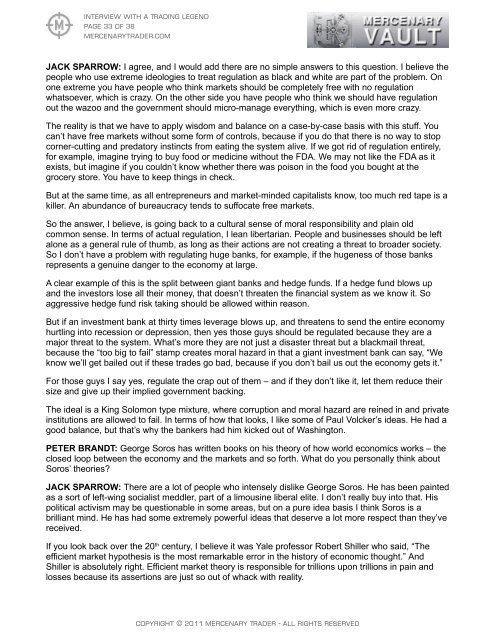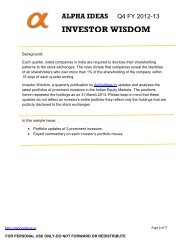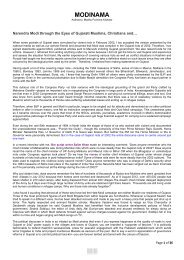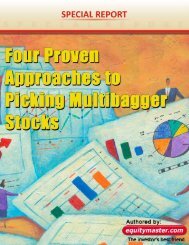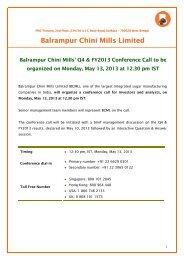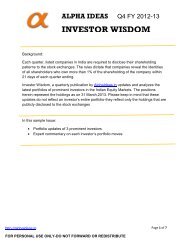Interview With a Trading Legend - Mercenary Trader
Interview With a Trading Legend - Mercenary Trader
Interview With a Trading Legend - Mercenary Trader
You also want an ePaper? Increase the reach of your titles
YUMPU automatically turns print PDFs into web optimized ePapers that Google loves.
<strong>Interview</strong> <strong>With</strong> a <strong>Trading</strong> <strong>Legend</strong><br />
Page 33 of 38<br />
mercenarytrader.com<br />
JACK SPARROW: I agree, and I would add there are no simple answers to this question. I believe the<br />
people who use extreme ideologies to treat regulation as black and white are part of the problem. On<br />
one extreme you have people who think markets should be completely free with no regulation<br />
whatsoever, which is crazy. On the other side you have people who think we should have regulation<br />
out the wazoo and the government should micro-manage everything, which is even more crazy.<br />
The reality is that we have to apply wisdom and balance on a case-by-case basis with this stuff. You<br />
can’t have free markets without some form of controls, because if you do that there is no way to stop<br />
corner-cutting and predatory instincts from eating the system alive. If we got rid of regulation entirely,<br />
for example, imagine trying to buy food or medicine without the FDA. We may not like the FDA as it<br />
exists, but imagine if you couldn’t know whether there was poison in the food you bought at the<br />
grocery store. You have to keep things in check.<br />
But at the same time, as all entrepreneurs and market-minded capitalists know, too much red tape is a<br />
killer. An abundance of bureaucracy tends to suffocate free markets.<br />
So the answer, I believe, is going back to a cultural sense of moral responsibility and plain old<br />
common sense. In terms of actual regulation, I lean libertarian. People and businesses should be left<br />
alone as a general rule of thumb, as long as their actions are not creating a threat to broader society.<br />
So I don’t have a problem with regulating huge banks, for example, if the hugeness of those banks<br />
represents a genuine danger to the economy at large.<br />
A clear example of this is the split between giant banks and hedge funds. If a hedge fund blows up<br />
and the investors lose all their money, that doesn’t threaten the financial system as we know it. So<br />
aggressive hedge fund risk taking should be allowed within reason.<br />
But if an investment bank at thirty times leverage blows up, and threatens to send the entire economy<br />
hurtling into recession or depression, then yes those guys should be regulated because they are a<br />
major threat to the system. What’s more they are not just a disaster threat but a blackmail threat,<br />
because the “too big to fail” stamp creates moral hazard in that a giant investment bank can say, “We<br />
know we’ll get bailed out if these trades go bad, because if you don’t bail us out the economy gets it.”<br />
For those guys I say yes, regulate the crap out of them – and if they don’t like it, let them reduce their<br />
size and give up their implied government backing.<br />
The ideal is a King Solomon type mixture, where corruption and moral hazard are reined in and private<br />
institutions are allowed to fail. In terms of how that looks, I like some of Paul Volcker’s ideas. He had a<br />
good balance, but that’s why the bankers had him kicked out of Washington.<br />
PETER BRANDT: George Soros has written books on his theory of how world economics works – the<br />
closed loop between the economy and the markets and so forth. What do you personally think about<br />
Soros’ theories?<br />
JACK SPARROW: There are a lot of people who intensely dislike George Soros. He has been painted<br />
as a sort of left-wing socialist meddler, part of a limousine liberal elite. I don’t really buy into that. His<br />
political activism may be questionable in some areas, but on a pure idea basis I think Soros is a<br />
brilliant mind. He has had some extremely powerful ideas that deserve a lot more respect than they’ve<br />
received.<br />
If you look back over the 20 th century, I believe it was Yale professor Robert Shiller who said, “The<br />
efficient market hypothesis is the most remarkable error in the history of economic thought.” And<br />
Shiller is absolutely right. Efficient market theory is responsible for trillions upon trillions in pain and<br />
losses because its assertions are just so out of whack with reality.<br />
Copyright © 2011 <strong>Mercenary</strong> <strong>Trader</strong> - All Rights Reserved


